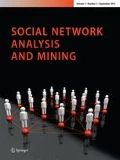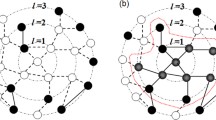Abstract
We propose a new model for the study of resilience of coevolving multiplex scale-free networks. Our network model, called preferential interdependent networks, is a novel continuum over scale-free networks parameterized by their correlation \(\rho , 0 \le \rho \le 1\). Our failure and recovery model ties the propensity of a node, both to fail and to assist in recovery, to its importance. We show, analytically, that our network model can achieve any \(\gamma , 2 \le \gamma \le 3\) for the exponent of the power law of the degree distribution; this is superior to existing multiplex models and allows us better fidelity in representing real-world networks. Our failure and recovery model is also a departure from the much studied cascading error model based on the giant component; it allows for surviving important nodes to send assistance to the damaged nodes to enable their recovery. This better reflects the reality of recovery in man-made networks such as social networks and infrastructure networks. Our main finding, based on simulations, is that resilient preferential interdependent networks are those in which the layers are neither completely correlated (\(\rho = 1\)) nor completely uncorrelated (\(\rho =0\)) but instead semi-correlated (\(\rho \approx 0.1 - 0.3\)). This finding is consistent with the real-world experience where complex man-made networks typically bounce back quickly from stress. In an attempt to explain our intriguing empirical discovery, we present an argument for why semi-correlated multiplex networks can be the most resilient. Our argument can be seen as an explanation of plausibility or as an incomplete mathematical proof subject to certain technical conjectures that we make explicit.





Similar content being viewed by others
References
Albert R, Jeong H, Barabási A-L (2000) The internet’s achilles’ heel: error and attack tolerance of complex networks. Nature 406:378–382
Barabasi A-L (1999) Albert R Emergence of scaling in random networks. Science 286(5439):509–512 arXiv:9910332
Basu P, Dippel M, Sundaram R (2015) Multiplex networks: a generative model and algorithmic complexity In: Proceedings of the 2015 IEEE/ACM international conference on advances in social networks analysis and mining 2015, ser. ASONAM ’15. ACM, New York, NY, USA, pp 456–463
Battiston F, Nicosia V, Latora V (2017) The new challenges of multiplex networks: measures and models. Eur Phys J Spec Top 226(3):401–416
Bhatia U, Kumar D, Kodra E, Ganguly AR (2015) Network science based quantification of resilience demonstrated on the Indian railways network. PLos ONE 10:1–17 arXiv:1508/1508.03542
Boccaletti S, Bianconi G, Herrero R, Genio C, Gómez-Gardeñes J, Romance M, Sendiña-Nadal I, Wang Z, Zanin M (2014) The structure and dynamics of multilayer networks. Phys Rep 544:1–122
Bollobas B, Riordan OM (2005) Mathematical results on scale-free random graphs. Wiley-Blackwell, New York, pp 1–34. https://doi.org/10.1002/3527602755.ch1
Buldyrev SV, Parshani R, Paul G, Stanley HE, Havlin S (2010) Catastrophic cascade of failures in interdependent networks. Nature 464(7291):1025–1028 arXiv:0907.1182
Chung F, Lu L (2006) Complex graphs and networks (Cbms regional conference series in mathematics). American Mathematical Society, Boston
De Domenico M, Solé-Ribalta A, Cozzo E, Kivelä M, Moreno Y, Porter MA, Gómez S, Arenas A (2013) Mathematical formulation of multilayer networks. Phys Rev X 3:041022. https://doi.org/10.1103/PhysRevX.3.041022
Dueñas-Osorio L, Mohan Vemuru S (2009) Cascading failures in complex infrastructure systems. Struct Saf 31:157–167
Erdös P, Rényi A (1959) On random graphs i. Publ Math Debr 6:290
Finance Y (2018) Done with Facebook. https://finance.yahoo.com/news/companies-celebrities-done-facebook-203114399.html. Accessed 22 April 2018
Fisher L (2015) Disaster responses: more than 70 ways to show resilience. Nature 518:35
Frieze A, Karoński M (2016) Introduction to random graphs. Cambridge University Press, Cambridge
Ganguly A, Mehta T, Sundaram R, Tiwari D (2018) Resilience and the coevolution of interdependent multiplex networks. In: IEEE/ACM 2018 international conference on advances in social networks analysis and mining, ASONAM 2018, Barcelona, Spain, August 28–31, 2018, pp. 226–233. https://doi.org/10.1109/ASONAM.2018.8508541
Gilbert EN (1959) Random graphs. Ann Math Stat 30(4):1141–1144
Henderson H, Blumenfeld L, Traylor A, Bhatia U, Kumar D, Kodra E, Ganguly AR (2017) Climate extremes and informing adaptation. Springer, Cham, pp 1–9. https://doi.org/10.1007/978-3-319-23519-6_1632-2
Hu Y, Ksherim B, Cohen R, Havlin S (2011) Percolation in interdependent and interconnected networks: abrupt change from second to first order transition. CoRR. arxiv: abs/1106.4128
Kim JY, Goh K-I (2013) Coevolution and correlated multiplexity in multiplex networks. Phys Rev Lett 111:058702. https://doi.org/10.1103/PhysRevLett.111.058702
Kurant M, Thiran P (2006) Layered complex networks. Phys Rev Lett 96:138701
Min B, Zheng M (2018) Correlated network of networks enhances robustness against catastrophic failures. arxiv: 1711.05317.pdf
Nicosia V, Bianconi G, Latora V, Barthelemy M (2013) Growing multiplex networks. Phys Rev Lett 111:058701 arXiv:1302.7126
Ouyang M (2012) A three-stage resilience analysis framework for urban infrastructure systems. Struct Saf 36–37:23–31
Ouyang M, Wang Z (2015) Resilience assessment of interdependent infrastructure systems: with a focus on joint restoration modeling and analysis. Reliab Eng Syst Saf 141:74–82
Park J, Seager TP, Rao PSC, Convertino M, Linkov I (2012) Integrating risk and resilience approaches to catastrophe management in engineering systems. Risk Anal 33(3):356–367. https://doi.org/10.1111/j.1539-6924.2012.01885.x
Rinaldi S, Peerenboom J, Kelly T (2002) Identifying, understanding, and analyzing critical infrastructure interdependencies. IEEE Control Syst Mag 21:11–25
Sela L, Bhatia U, Zhuang J, Ganguly A (2017) Resilience strategies for interdependent multiscale lifeline infrastructure networks. Comput Civ Eng. doi 10(1061/9780784480847):033
Watts DJ, Strogatz SH (1998) Collective dynamics of ’small-world’ networks. Nature 393(6684):440–442
Wikipedia (2010) Arab Spring. https://en.wikipedia.org/wiki/Arab_Spring. Accessed 22 April 2018
Wikipedia (2014a) FireChat. https://en.wikipedia.org/wiki/FireChat. Accessed 22 April 2018
Wikipedia (2014b) Hong Kong protests. https://en.wikipedia.org/wiki/2014_Hong_Kong_protests. Accessed 22 April 2018
Wikipedia (2017) Hurricane Maria. https://en.wikipedia.org/wiki/Hurricane_Maria. Accessed 22 April 2018
Wikipedia (2018) Facebook–Cambridge analytica data scandal. https://en.wikipedia.org/wiki/Facebook%E2%80%93Cambridge_Analytica_data_scandal. Accessed 22 April 2018
Wolfram alpha calculation. https://www.wolframalpha.com/input/?i=df%28t%29%2Fdt+%3D+p+*+%28f%28t%29+%2B+A%29%2F%282%28t%2BN%29%29+%2B+%281+-+p%29+f%28t%29%2F%282t%29+
Wormald NC (1999) The differential equation method for random graph processes and greedy algorithms. Lectures on approximation and randomized algorithms, vol 73. Cambridge University Press, Cambridge, p 155
Acknowledgements
We thank Jianxi Gao for helpful discussions and anonymous reviewers for useful feedback. This work was supported in part by the Global Resilience Institute and the National Science Foundation Grant CCF-1535929.
Author information
Authors and Affiliations
Corresponding author
Additional information
Publisher's Note
Springer Nature remains neutral with regard to jurisdictional claims in published maps and institutional affiliations.
Rights and permissions
About this article
Cite this article
Ganguly, A., Mehta, T., Patel, T. et al. Resilience and coevolution of preferential interdependent networks. Soc. Netw. Anal. Min. 10, 3 (2020). https://doi.org/10.1007/s13278-019-0614-6
Received:
Revised:
Accepted:
Published:
DOI: https://doi.org/10.1007/s13278-019-0614-6




